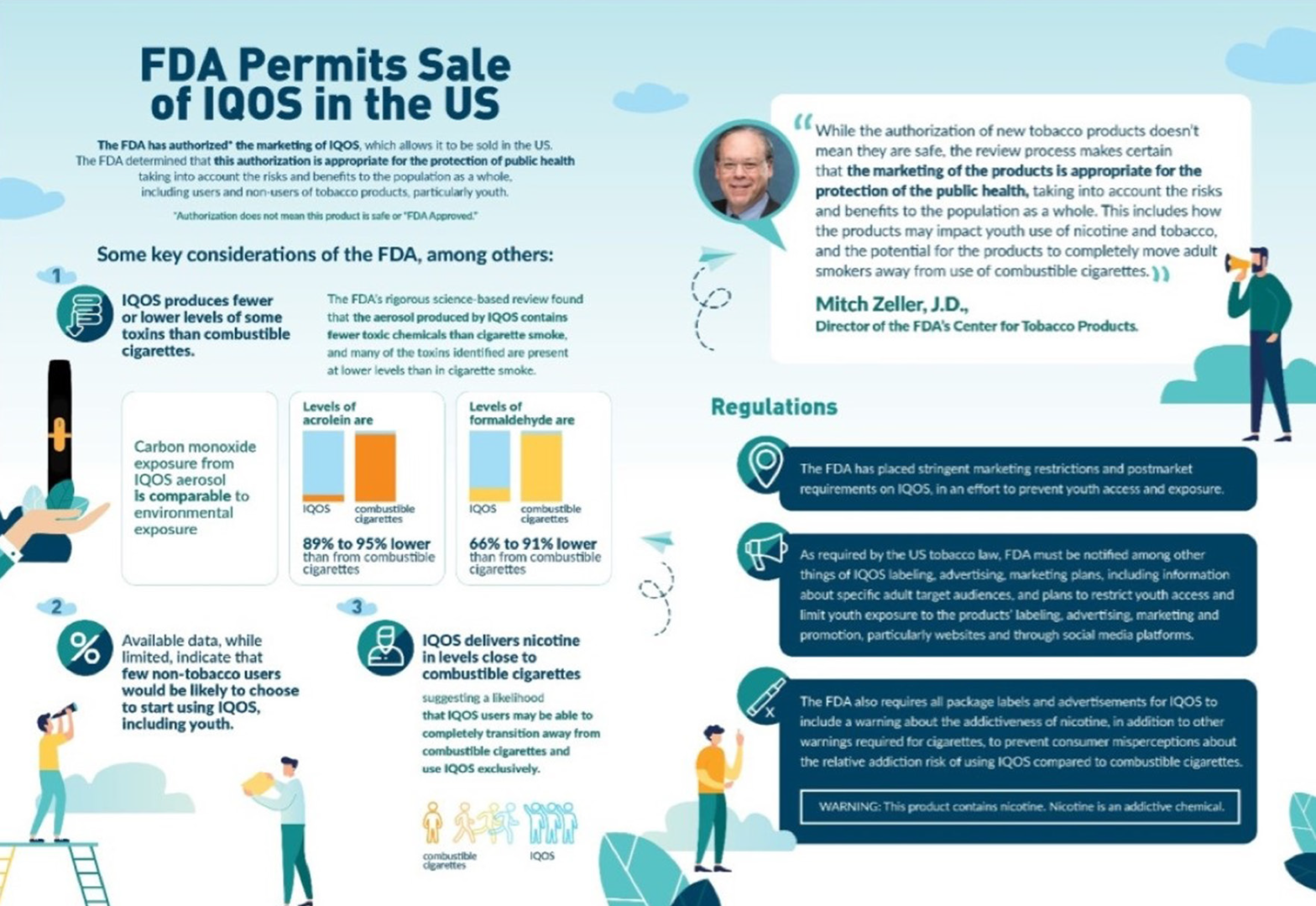There are two separate decisions that the FDA makes about new products: (1) whether to authorize the sale of the product, and, if they allow sale of a product, (2) whether to allow a company to make reduced exposure or reduced risk claims about the product.
To further confuse the situation, the separate decisions about whether to permit reduced exposure (delivers lower levels of some toxins) and reduce risk (lower health risks) both fall under the same section of the law on “modified risk.”
FDA’s decision to allow Philip Morris to sell its heated tobacco product IQOS in the US in 2019 (the first decision) did not address PM’s request to make reduced exposure and reduced risk claims in its marketing. We and others have criticized the FDA for authorizing the sale (the first decision) of its heated tobacco product IQOS.
Despite the limited scope of the FDA decision to authorize marketing, PM used the FDA’s decision to allow marketing inside the US in its marketing outside the US (figure).
A year later, in 2020, the FDA make the second decision, allowing PM to make reduced exposure claims but explicitly prohibiting PM from making reduced risk claims.
PM has been further exploiting the arcane wording of the US law governing the FDA to make carefully worded statements around the world that can easily be misunderstood to imply that the FDA decided that IQOS was a reduced risk product, something the FDA specifically did not do.
Lauren Lempert, Stella Bialous and I recently published “FDA’s reduced exposure marketing order for IQOS: why it is not a reliable global model” in Tobacco Control to explain what happened in the US and why the FDA process — which followed US law — is not a good model for the rest of the world.
In particular, we argue that FDA should not have even authorized reduced exposure claims:
FDA should not have issued the order because of the inherent confusion between reduced-exposure and reduced-risk products and because PMPSA failed to meet its burden to demonstrate that IQOS exposes users to substantially reduced levels of dangerous substances, that consumers will not be misled by the reduced-exposure claims and that IQOS protects public health. Unless and until additional evidence is produced, FDA should revise its [marketing] order for IQOS. In the future, FDA should not issue any reduced-exposure or reduced-risk [marketing] order unless the applicant provides sufficient scientific evidence to support its claim, including clear and convincing evidence that reduced-exposure orders will not be misunderstood by consumers as reduced risk statements. Other countries should reject tobacco companies’ unsubstantiated claims of reduced harm associated with HTPs and resist PMI’s and other companies’ calls to relax HTP regulations based on the FDA’s actions. Countries should, instead, adopt policies aligned with the FCTC goals when dealing with HTPs and other novel tobacco products.
The abstract summarizes the overall situation:
The US Food and Drug Administration (FDA) issued orders in July 2020 authorising Philip Morris Products S.A. to market its heated tobacco product (HTP) IQOS inside the USA with claims that it reduces exposure to some dangerous substances. FDA’s ‘reduced-exposure’ orders explicitly prohibit the marketing of IQOS with claims that IQOS will reduce harm or the risk of tobacco-related diseases. Under US law, FDA’s IQOS orders are problematic because FDA disregarded valid scientific evidence that IQOS increases exposure to other dangerous toxins and that Philip Morris Products S.A. failed to demonstrate that consumers understand the difference between reduced-exposure and reduced-harm claims. Unfortunately, both ‘reduced-exposure’ and ‘reduced-harm’ are classified as ‘modified risk tobacco products’ under US law. Exploiting this confusion, Philip Morris International used the FDA decision as the basis for marketing and public relations campaigns outside the USA to press governments to reverse policies that ban or regulate the sales and marketing of HTPs, including IQOS. Parties to the WHO Framework Convention on Tobacco Control should reject tobacco companies’ unsubstantiated explicit or implied claims of reduced harm associated with HTPs and resist Philip Morris International’s and other companies’ calls to relax HTP regulations based on the FDA’s actions. Instead, parties should adopt policies aligned with the Framework Convention on Tobacco Control when dealing with HTPs and other novel tobacco products.
The full citation for the paper is: Lempert LK, Bialous S, Glantz S. FDA’s reduced exposure marketing order for IQOS: why it is not a reliable global model. Tob Control. 2021 Apr 2:tobaccocontrol-2020-056316. doi: 10.1136/tobaccocontrol-2020-056316. Epub ahead of print. PMID: 33811155. It is available here and here.
